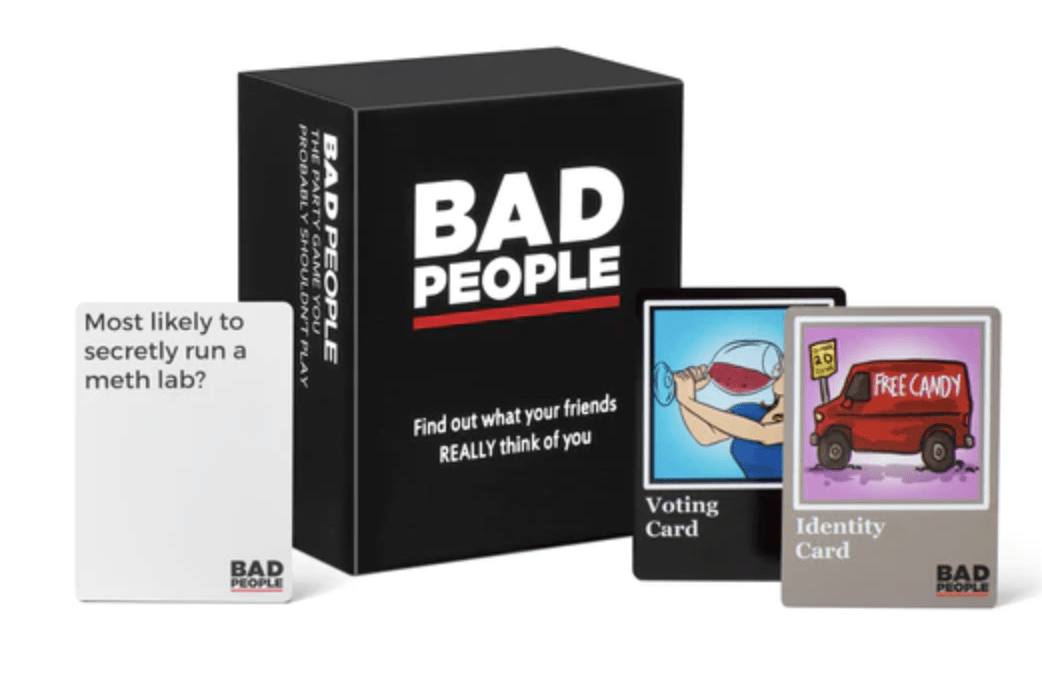For my critical play, I decided to analyze “Bad People,” an adult, provocative “get-to-know-you” style card game created by Mike Lancaster. Intended for adult players due to its NSFW content, it supports 3-10 players and it really thrives on social interactions shaped by revealing funny answers to set prompts. Because of this, I chose to compare it to our team’s game prototype, “Dare to Share,” since it shares that fundamental similarity in that it also aims to foster interpersonal gameplay with a more competitive/technical edge.
As for just a blanket comparison of the games, “Bad People” focuses on the aesthetic of fellowship and humor, achieved through straightforward mechanics, and definitely emphasizes the importance of player interactions over intricate rules or game components. “Dare to Share,” however, uses a more intricate set of mechanics to achieve a similar aesthetic of social interaction but adds a competitive twist. Our use of modifiers and action cards hopefully makes the game not only about how players interact with each other but also about how they manipulate the game rules to their advantage.
But just like our prototype, “Bad People” is built around direct player judgments. Each round is led by a player assuming the role of The Dictator, who draws a question card and silently selects a player they believe fits that prompt. The questions are typically edgy, probing into personal habits or potentially embarrassing traits. These kinds of questions are very similar to cards in our game as well, since the high point value questions (a.k.a more embarrassing questions) also tend to be pretty NSFW. Players then have to guess on who they think was chosen, with points awarded for correct guesses.
This voting system was one area that’s in both games, but implemented completely differently. For “Bad People”, the way to win and get points all comes down to whatever the dictator thinks, which naturally is completely subjective. When playing the game, I found this mechanic to often deter us from going with the answer we actually believed. For example, in one round the question for the group was “If I had to send one person to jail for a year, who would I choose?” Right away, a few good options stood out, such as one of my friends who notoriously tries to convince us he’s the most “street-smart” out of the group, or my other friend who is an extreme germaphobe. All of these would have been funny answers, however, we also knew that one of the players in the circle has a huge Venmo debt to the current dictator, so it was pretty obvious to deduce who the dictator was going to pick. Because of this, we all put down that person, and sure enough we were correct.
So, because the points are awarded for guessing the correct person, it often made us not want to actually say the person we truly wanted to say, which we found heavily limited group communication and humor. This is a huge distinction between Dare To Share’s voting system, which instead pre assigns points to questions. For example, more tame questions only lend 1 point whereas the craziest ones give up to 3. At the end of the round, the group anonymously votes on one “round winner”, who then is awarded bonus points. With this outlet of collecting points, I believe that Dare To Share offers much more freedom and creativity for all the players, since this naturally encourages players to try to be as funny as possible (which then brings out everyone’s different senses of humor much more naturally). Because of this, I found that Bad People’s voting system led to much more group think and “point-fishing” compared to our prototype’s more natural approach, where humor and gameplay came first, and points were a secondary thought that were an extra bonus.
In fact, my friend Lily won both rounds of the game since they had used all their double down cards each game, and was definitely tailoring the guesses exactly to what the dictator was going to say (they admitted this after during the reflecting period). Of course, I understand that’s the objective of the game, but it definitely not only discouraged being creative/funny with your answers, but Lily claimed it made winning much less satisfying/rewarding compared to similar games.
Another key difference is that “Dare to Share” incorporates a more complex system involving Questions cards, Modifiers, and Action cards. There are already 8 modifiers, and on top of that there are currently 12 action cards. The intent was that players can up the stakes by adding modifiers to alter the question’s difficulty or condition, and also use action cards to influence not just their own turns but those of others. After playtesting our game today in class though, we found a huge issue in that the sheer amount of choices and cards can complicate and get in the way of the “get to know you” objective (especially as a drinking game or in a party setting). On the flip side, “Bad People” keeps it straightforward with just Question cards and Double Down cards, the latter letting you snag double points if you nail the Dictator’s pick. When playing, I found that this simplicity pretty much just let us dive right into the fun without getting bogged down by complex rules. It makes for smoother gameplay and really pumps up the social vibe, which I figure is what people want in a party game. Of course, games take time to learn, and so people who have played Dare to Share before won’t have that issue. But I realized after playing Bad People that for the party-game genre, it’s probably best to balance complexity with ease of use out of the box, since no one wants to read a 10 page manual just to play a party game.



